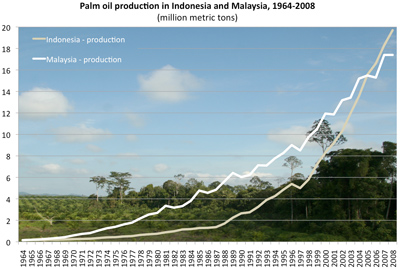With one of the highest rates of deforestation in the world, the world’s third largest greenhouse gas emissions due mostly to forest loss, and with a rich biodiversity that is fighting to survive amid large-scale habitat loss, Indonesia today announced a deal that may be the beginning of stopping forest loss in the Southeast Asian country. Indonesia announced a two year moratorium on granting new concessions of rainforest and peat forest for clearing in Oslo, Norway, beginning in January 2011, however concessions already granted to companies will not be stopped. The announcement came as Indonesia received 1 billion US dollars from Norway to help the country stop deforestation.
“Indonesia is prepared to suspend for two years new concessions for the conversion of peat and natural forest lands,” said a statement from Indonesia as reported by Reuters. “Sufficient non-forest lands exist for Indonesia to accommodate the growth of its vitally important plantation industries, a major source of livelihoods in Indonesia.” Plantation expansion, including palm oil and pulp-and-paper, will focus on lands that are already degraded.
 |
Greenpeace, which has long fought deforestation in Indonesia, analyzed the announcement in a blog today: “This is good news, especially if it makes it into a presidential decree when [Indonesian President] Yudhoyono gets back to Jakarta, and the moratorium was a precondition laid down by Norway for its $1bn share of the financial deal which is specifically targeted at Indonesia. But it doesn’t address the millions of hectares which are already in the clutches of logging companies […]Without including existing concessions, deforestation will still continue apace.”
In fact Indonesia has confirmed that a 1.6 million hectare (4 million acres) agriculture estate planned for the Papua province on the western half of the island of New Guinea will still go ahead.
“But it will be in the context of this green policy,” Papua governor Barnabas Suebu told Reuters. “The land that will be used for the food estate is of very low value of carbon and biodiversity.”
In addition, since the moratorium doesn’t go into effect until January—based on the letter of intent—some fear that concessions will be continued you to be granted at a booming rate over the next six months, putting more forests and species in jeopardy.
The announcement and the donation of 1 billion US dollars from Norway is seen as the beginning of a REDD+ (Reduced Emissions from Deforestation and Degradation) program in Indonesia. In fact a portion of the monies will go toward setting up a monitoring system for REDD+ and beginning REDD+ projects.
The meeting in Norway included the announcement of 4 billion US dollars to begin REDD+ projects worldwide. The funds were promised last year at the Copenhagen Climate Conference and have been put forward by the United States, France, Germany, Britain, Australia, Norway, and Japan. Denmark and Sweden promised an addition 73 million US dollars.
Indonesia is second in deforestation loss after Brazil. Between 1990 and 2005, Indonesia lost more than 28 million hectares of forest, including 21.7 hectares of virgin forest. The country’s forest cover has declined from 82 percent in the 1960s to less than fifty percent today.
 Aerial view of peatland destruction in Indonesian Borneo. Photo by: Rhett A. Butler.
Aerial view of peatland destruction in Indonesian Borneo. Photo by: Rhett A. Butler.
Related articles
Norway to provide Indonesia with $1 billion to protect rainforests
(05/19/2010) Norway will provide up to $1 billion to Indonesia to help reduce deforestation and forest degradation, reports The Jakarta Post.
Nestle caves to activist pressure on palm oil

(05/17/2010) After a two month campaign against Nestle for its use of palm oil linked to rainforest destruction spearheaded by Greenpeace, the food giant has given in to activists’ demands. The Swiss-based company announced today in Malaysia that it will partner with the Forest Trust, an international non-profit organization, to rid its supply chain of any sources involved in the destruction of rainforests. “Nestle’s actions will focus on the systematic identification and exclusion of companies owning or managing high risk plantations or farms linked to deforestation,” a press release from the company reads, adding that “Nestle wants to ensure that its products have no deforestation footprint.”

(05/03/2010) Over the past 30 years billions of dollars has been committed to global conservation efforts, yet forests continue to fall, largely a consequence of economic drivers, including surging global demand for food and fuel. With consumption expected to far outstrip population growth due to rising affluence in developing countries, there would seem to be little hope of slowing tropical forest loss. But some observers see new reason for optimism—chiefly a new push to make forests more valuable as living entities than chopped down for the production of timber, animal feed, biofuels, and meat. While are innumerable reasons for protecting forests—including aesthetic, cultural, spiritual, and moral—most land use decisions boil down to economics. Therefore creating economic incentives to maintaining forests is key to saving them. Leading the effort to develop markets ecosystem services is Forest Trends, a Washington D.C.-based NGO that also organizes the Katoomba group, a forum that brings together a wide variety of forest stakeholders, including the private sector, local communities, indigenous people, policymakers, international development institutions, funders, conservationists, and activists.
Indonesia to establish rainforest trust fund
(03/30/2010) Indonesia is preparing to establish a trust fund to reduce deforestation, reports the Jakarta Globe.

(03/25/2010) Global forest loss has diminished since the 1990s but still remains “alarmingly high”, according to a preliminary version of a new assessment from the U.N. Food and Agriculture Organization (FAO). The report, Global Forest Resources Assessment 2010 (FRA 2010), shows that global forest loss slowed to around 13 million hectares per year during the 2000s, down from about 16 million hectares per year in the 1990s. It finds that net deforestation declined from about 8.3 million hectares per year in the 1990s to about 5.2 million hectares per year in the 2000s, a result of large-scale reforestation and afforestation projects, as well as natural forest recovery in some countries and slowing deforestation in the Amazon.
Half of Indonesia’s mangroves gone in less than thirty years
(03/23/2010) The Jakarta Post reports that, according to the local NGO People’s Coalition for Justice in Fisheries (Kiara), Indonesia’s has lost 2.2 million hectares of mangroves in less than thirty years, going from covering 4.2 million hectares in 1982 to just 2 million hectares today.
Indonesia opens protected rainforests to mining and other developments
(03/16/2010) Indonesian President Susilo Bambang Yudhoyono has issued new regulations, which will allow underground mining in protected areas, according to the Jakarta Post. The new rules will also allow power plants, renewable energy, and transportation such as toll roads in protected forests.

(03/01/2010) It is no secret that orangutans are threatened with extinction because their rain forests are being destroyed at an alarming rate. Ten years ago, Shawn Thompson, a writer, former journalist and university professor, set out to chronicle the threat to orangutans in a book released in March 2010. The book is called The Intimate Ape: Orangutans and the Secret Life of a Vanishing Species. The book spends most of the time talking about the nature of orangutans and the relationships between orangutans and people. But the ultimate underlying message is there about the source of the peril to orangutans and the solution. Thompson says that the problem of saving orangutans has to do with communications and human nature.
Conflicting signals out of Indonesia on whether palm oil plantations will be classified as forests
(02/23/2010) Indonesia will not allow the conversion of natural forest for oil palm plantations, claimed the country’s Forestry Minister Zulkifli Hasan in comments reported by the Jakarta Post.
REDD may not provide sufficient incentive to developers over palm oil
(02/22/2010) In less than a generation oil palm cultivation has emerged as a leading form of land use in tropical forests, especially in Southeast Asia. Rising global demand for edible oils,
coupled with the crop’s high yield, has turned palm oil into an economic juggernaut, generating us$ 10 billion in exports for Indonesia and Malaysia, which account for 85 percent of palm oil production, alone. Today more than 40 countries – led by China, India, and Europe – import crude palm oil.
Indonesia to target New Guinea for agricultural expansion
(02/22/2010) Indonesia will target its last frontier — its territory on New Guinea — as it seeks to become a major agricultural exporter, reports the AFP.